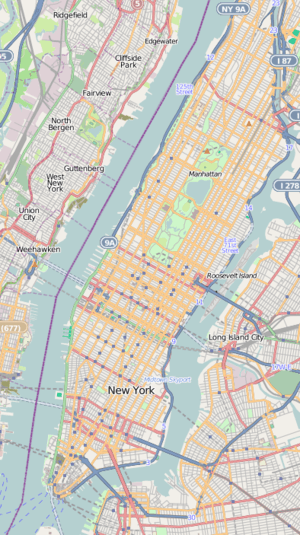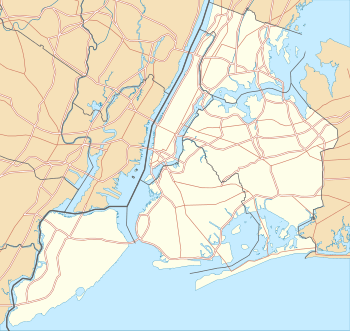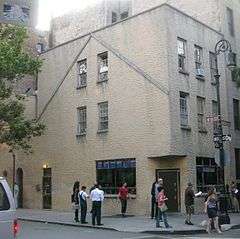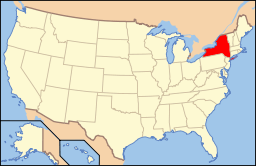Julius (restaurant)
|
Julius' Bar | |
|
South (front) facade in 2008 | |
    Location in New York City | |
| Location | West Village, Manhattan, NY |
|---|---|
| Coordinates | 40°44′4″N 74°0′5″W / 40.73444°N 74.00139°WCoordinates: 40°44′4″N 74°0′5″W / 40.73444°N 74.00139°W |
| Built | 1867 |
| NRHP Reference # | 16000242 |
| Added to NRHP | April 20, 2016 |
Julius, located at 159 West 10th Street at Waverly Place, is a tavern in Manhattan's Greenwich Village neighborhood in New York City.[1] It is often called the oldest continuously operating gay bar in New York City; however, its management was actively unwilling to operate as such and harassed gay customers until 1966.
An event at the Julius bar at 159 West 10th Street in 1966, which is a block northeast of the famous Stonewall Inn, established the right of homosexuals to be served in licensed premises in New York. This cleared the way for the opening of many new gay premises with state liquor licenses.
Newspaper articles on the wall indicate it was the favorite bar of Tennessee Williams, Truman Capote and Rudolf Nureyev.[2] In 2016 it was listed on the National Register of Historic Places.[3]
History
According to bar lore it was established around 1867 – the same year as the Jacob Ruppert Brewery in the Yorkville neighborhood. Barrels stamped "Jacob Ruppert" are used for tables. Vintage photos of racing horses, boxers and actors are on the wall include drawings of burlesque girls as well as an image signed by Walter Winchell saying that he loves Julius.[4] The bar became a popular watering hole in the 1930s and 1940s due to its proximity to the jazz club Nick's in the Village.[4]
By the late 1950s it was attracting gay patrons. At the time the New York State Liquor Authority had a rule that ordered bars not to serve liquor to the disorderly, and homosexuals per se were considered "disorderly." Bartenders would often evict known homosexuals or order them not to face other customers in order to avoid cruising. Despite this, gay men continued to be a large part of the clientele into the early 1960s, and the management of Julius, steadfastly unwilling for it to become a gay bar, continued to harass them.[5]
The Sip-in
On April 21, 1966 members of the New York Chapter of the Mattachine Society staged a "Sip-In" at the bar which was to change the legal landscape.[6] Dick Leitsch, the society's president, John Timmons and Craig Rodwell planned to draw attention to the practice by identifying themselves as homosexuals before ordering a drink in order to bring court scrutiny to the regulation. The three were going to read from Mattachine stationary "We are homosexuals. We are orderly, we intend to remain orderly, and we are asking for service."
The three first targeted the Ukrainian-American Village Restaurant at St. Mark's Place and Third Avenue in the East Village, Manhattan which had a sign, "If you are gay, please go away." The three showed up after a New York Times reporter had asked a manager about the protest and the manager had closed the restaurant for the day.[7] They then targeted a Howard Johnson's and a bar called Waikiki where they were served in spite of the note with a bartender saying later, "How do I know they're homosexual? They ain't doing nothing homosexual."
Frustrated, they then went to Julius, where a clergyman had been arrested a few days earlier for soliciting sex. A sign in the window read, "This is a raided premises." The bartender initially started preparing them a drink but then put his hand over the glass which was photographed. The New York Times ran a headline the next day "3 Deviates Invite Exclusion by Bars."
The Mattachines then challenged the liquor rule in court and the courts ruled that gays had a right to peacefully assemble, which undercut the previous SLA contention that the presence of gay clientele automatically was grounds for charges of operating a "disorderly" premise. With this right established a new era of licensed, legally operating gay bars began. The bar now holds a monthly party called Mattachine.
Subsequent history
Scenes from the movie Boys in the Band (1970) were shot at the bar.[2]
Julius was the site of a scene shot in the movie Next Stop, Greenwich Village (1976). The scene included Lenny Baker and Christopher Walken.
In August 2007, the bar was closed briefly after being seized for non-payment of taxes.[8]
Julius was the site of a scene in Ira Sachs' gay indie movie Love is Strange (2014). The scene included John Lithgow and Alfred Molina. The wrap party also took place at the bar.[9]
In 2012, in response to research and a request from the Greenwich Village Society for Historic Preservation, the New York State Division for Historic Preservation determined Julius eligible for listing on the National Register of Historic Places. The letter of eligibility stated, “The building meets the criteria for listing in the area of social history for its association with the LGBT civil rights movement.” It mentioned that the building’s interior “remains remarkably intact from the 1966 era of significance.”[10] It was listed in 2016.[3]
In fiction
The Julius's denial of service was dramatized in the film Stonewall (1995). However, filmmakers moved the denial of service from Julius to the Stonewall Inn.
See also
- List of pre-Stonewall LGBT actions in the United States
- National Register of Historic Places listings in Manhattan below 14th Street
References
- ↑ "Home". Juliusbarnyc.com. Retrieved 2013-10-29.
- 1 2 Biederman, Marcia (11 June 2000). "Journey to an Overlooked Past". Retrieved 1 September 2016 – via NYTimes.com.
- 1 2 "Weekly List of Actions Taken on Properties 4/25/16 through 4/29/16". U.S. National Park Service. May 6, 2016. Retrieved May 13, 2016.
- 1 2 Moss, Jeremiah (21 December 2007). "Julius' Bar". Retrieved 1 September 2016.
- ↑ "GAY SIXTIES". Retrieved 1 September 2016.
- ↑ "Remembering a 1966 'Sip-In' for Gay Rights". Retrieved 1 September 2016.
- ↑ Before Stonewall: Remembering that, before the riots, there was a Sip-In – Village Voice – June 17, 2008
- ↑ EaterWire AM Edition: Julius Closed, Seized For Nonpayment of Taxes – eater.com – August 29, 2007
- ↑ Team, Page Six (4 October 2013). "Sightings…". Retrieved 1 September 2016.
- ↑ "West Village Julius' Bar Eligible for State and National Historic Registers". Greenwich Village Society for Historic Preservation. Retrieved 30 September 2014.


